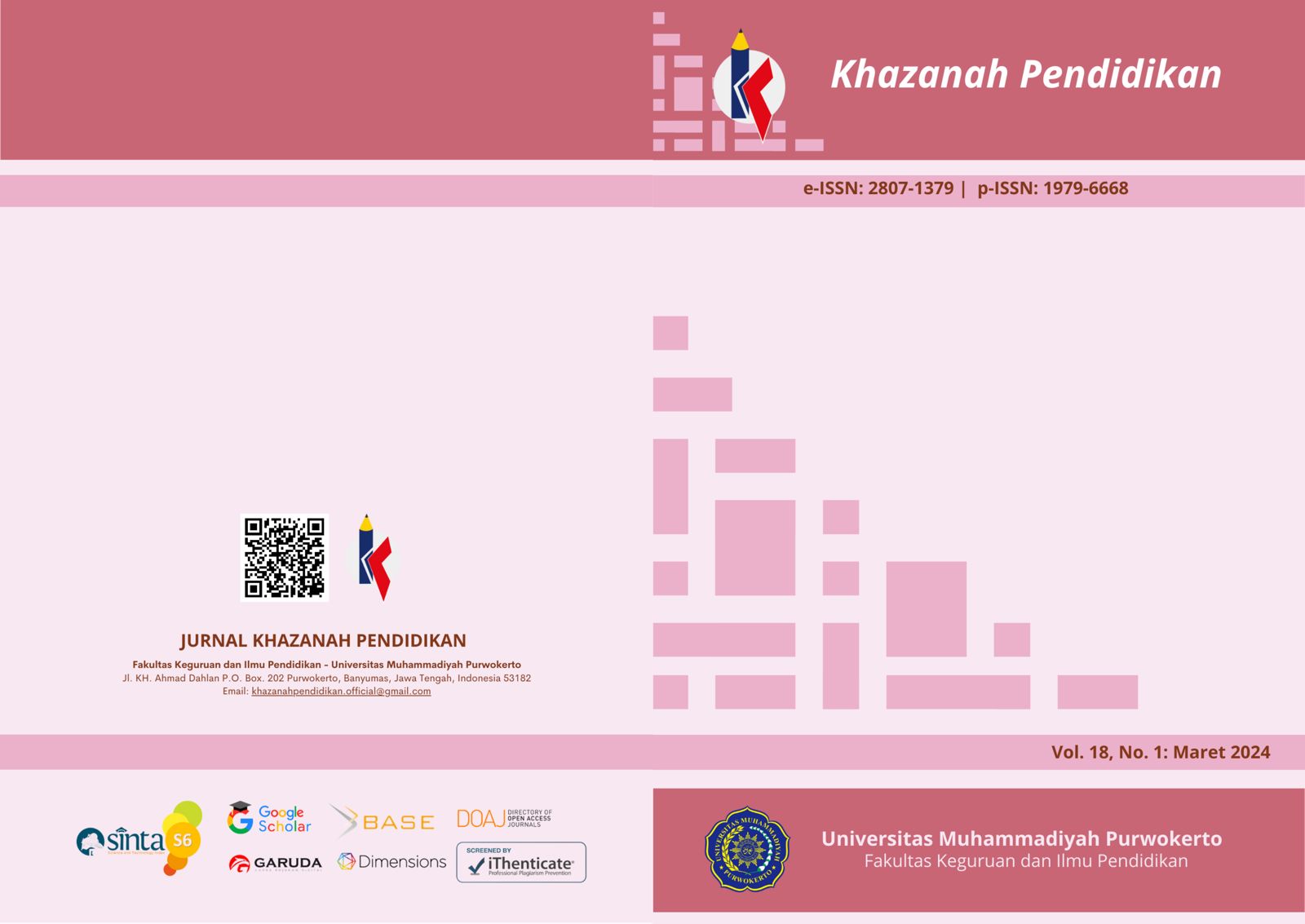ANALISIS KEMAMPUAN PEMECAHAN MASALAH MATEMATIS PESERTA DIDIK DALAM MENYELESAIKAN SOAL MATERI PELUANG TINGKAT SMA
DOI:
https://doi.org/10.30595/jkp.v18i1.20396Keywords:
Analysis, problem solving skills, probabilityAbstract
Problem solving skills are important skills for every learner. This study aims to analyze the mathematical problem solving ability of students in solving class X opportunity problems for 2022/2023 school year. This study used survey research methods with data collection techniques through interviews and tests of mathematical problem solving skills as many as three questions. This research uses content analysis techniques namely by analyzing the result of student work in accordance with scoring guidelines. After the mathematical problem solving ability test is given, learners will be classified into three categories, namely high,medium, and low. The results of the analysis show that students still make many mistakes in the Polya problem solving procedure. They are only able to solve problems by following the example given during learning. The conclusion of this study is that the problem solving ability of students is solving opportunity problem is still lacking, In addition, they did not perform the last stage of Polya, which was to re-examine the answers.Â
References
Aprida, V., Pramita, A., Matematika, P., Pendidikan MIPA dan Teknologi, F., Kunci, K., & Pemecahan Masalah, K. (2021). ANALISIS KEMAMPUAN PEMECAHAN MASALAH MATEMATIS SISWA DALAM MENYELESAIKAN SOAL MATERI LINGKARAN. In Jurnal Prodi Pendidikan Matematika (JPMM) (Vol. 3, Issue 1).
Hewi, L., Shaleh, M., & IAIN Kendari, P. (2020). Refleksi Hasil PISA (The Programme For International Student Assesment): Upaya Perbaikan Bertumpu Pada Pendidikan Anak Usia Dini). 04(1), 30–41.
KEMAMPUAN KONEKSI MATEMATIK DALAM PEMBELAJARAN MATEMATIKA. (n.d.).
Lampung, U., Sumantri, J., No, B., & Lampung, B. (n.d.). Pentingnya LKPD pada Pendekatan Scientific Pembelajaran Matematika Pentingnya LKPD pada Pendekatan Scientific Pembelajaran Matematika Umbaryati.
Novia, D., & Lubur, L. (n.d.). Analisis Kemampuan Pemecahan Masalah Pada Materi Fungsi Melalui Penerapan Model Pendidikan Matematika Realistik. http://ejournal.mandalanursa.org/index.php/JIME/index
Polya, G. (1945). How to Solve It.
Purba, D., Lubis, R., Pendidikan Matematika dan Ilmu Pengetahuan Alam, F., & Pendidikan Tapanuli Selatan Abstrak, I. (2021). PEMIKIRAN GEORGE POLYA TENTANG PEMECAHAN MASALAH. In Mathematic Education Journal)MathEdu (Vol. 4, Issue 1). http://journal.ipts.ac.id/index.php/
Putridayani, I. B., Chotimah, S., Siliwangi, I., Terusan, J., Sudirman, J., Cimahi, K., & Barat, J. (n.d.). ANALISIS KESULITAN BELAJAR SISWA DALAM PELAJARAN MATEMATIKA PADA MATERI PELUANG. In Maret (Vol. 7, Issue 1).
Rahmat, S. K., & Arham, H. R. (2022). Analisis Kemampuan Pemecahan Masalah Matematis Peserta didik pada Materi Peluang. Lattice Journal : Journal of Mathematics Education and Applied, 2(1), 27. https://doi.org/10.30983/lattice.v2i1.5542
Rizky Pinem, M., Solfitri, T., Studi Pendidikan Matematika, P., Keguruan Ilmu Pendidikan, F., & Riau Jl Bina Widya Simpang Baru, U. (2022). Pengembangan Perangkat Pembelajaran Materi SPLTV Berbasis Model Problem Based Learning Kelas X SMA/MA. 06(01), 133–146.
Rosyad, A. M., & Zuchdi, D. (2018). Aktualisasi pendidikan karakter berbasis kultur sekolah dalam pembelajaran IPS di SMP. Harmoni Sosial: Jurnal Pendidikan IPS, 5(1), 79–92. https://doi.org/10.21831/hsjpi.v5i1.14925
Sulianto, J., Matematika, P., Ikip, F., & Semarang, P. (2008). PENDEKATAN KONTEKSTUAL DALAM PEMBELAJARAN MATEMATIKA UNTUK MENINGKATKAN BERPIKIR KRITIS PADA SISWA SEKOLAH DASAR (Vol. 4, Issue 2).
Downloads
Published
Issue
Section
License
Authors who publish with this journal agree to the following terms:
Authors retain copyright and grant the journal right of first publication with the work simultaneously licensed under a Creative Commons Attribution License that allows others to share the work with an acknowledgement of the work's authorship and initial publication in this journal.
Authors are able to enter into separate, additional contractual arrangements for the non-exclusive distribution of the journal's published version of the work (e.g., post it to an institutional repository or publish it in a book), with an acknowledgement of its initial publication in this journal.
Authors are permitted and encouraged to post their work online (e.g., in institutional repositories or on their website) prior to and during the submission process, as it can lead to productive exchanges, as well as earlier and greater citation of published work (See The Effect of Open Access).

Khazanah Pendidikan is licensed under a Creative Commons Attribution 4.0 International License.


